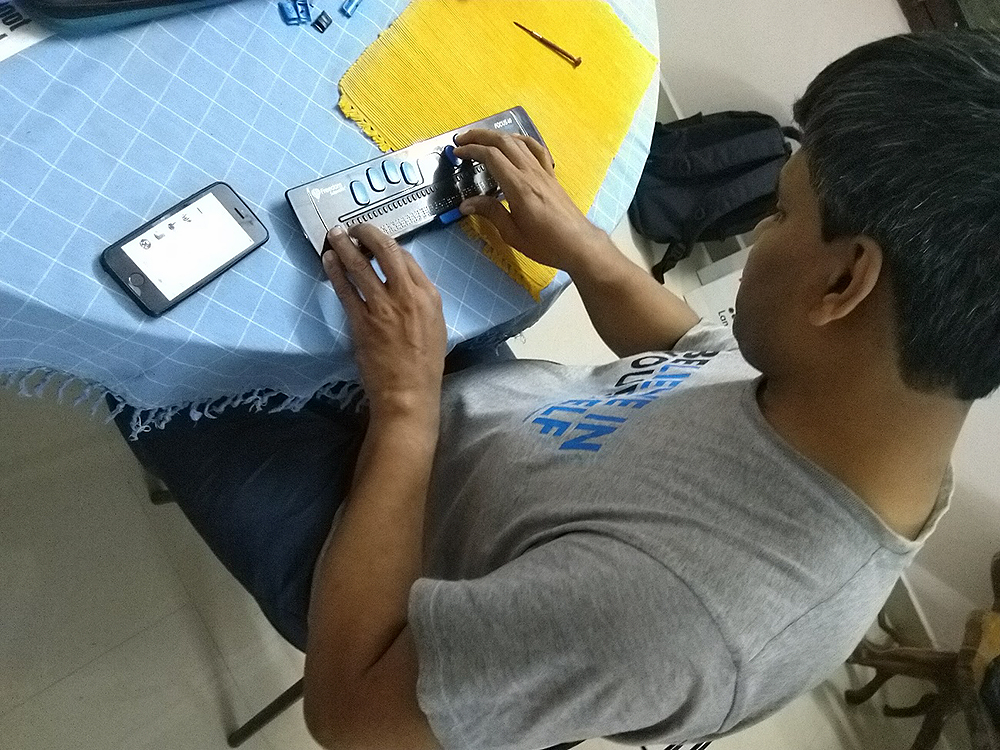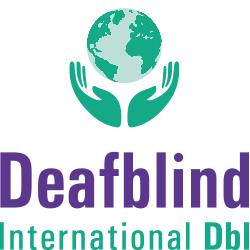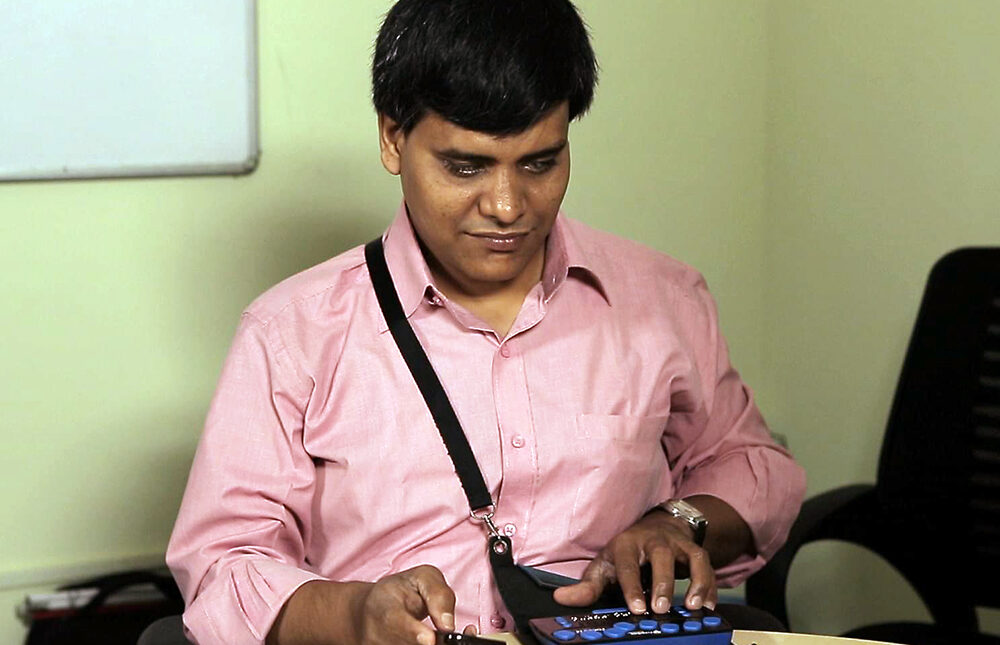Pradip Sinha is chairperson of the Society for the Empowerment of the Deafblind [SEDB] of India.
What technology do you use in your day to day? Computer? Smartphone? Tablet? Tell us what you use.
I rely a lot on my phone. I carry it everywhere and have a little braille display that I can attach to it so I can receive and send easily. I have a little bag into which everything fits and I am very careful with this. I use my laptop for all my work and it is also easy for me to check and reply to email or read the news or do correspondence on it. I use another RBD with my laptop that is bigger and longer so it is efficient for reading and editing big documents. I also have a radar cane called TorchIt. It was a lot of fun to learn how to use it but in the end, I find the constant vibration really annoying and am happier with my own old folding cane.
What needs do you have to be able to use these devices?
Well, the first thing is how expensive it is. Other people can just buy a phone, but I need the refreshable braille display and this is expensive. A second problem is how often it breaks down and the third problem, how hard it is to get anything fixed!! I try to fix things on my own because I can’t just send it off – it takes so long and what will I use while they fix it? People don’t understand that this is not a luxury or just for fancy – without these things I can’t work, can’t do so many things independently.
Another problem I have had is while travelling – each country, each hotel has different systems of wifi connection and I have to disconnect my bluetooth in order to connect to wifi and then I can reconnect the bluetooth and continue. But the minute I disconnect my bluetooth I lose connection with my braille device, so I need to take help to get everything set up correctly. If the access provider traveling with me doesn’t have a good knowledge of technology, then it is really frustrating. There is no standard training to prepare someone to be an access provider for us – we have to do the training and this is really really frustrating.
Finally – a big and frustrating problem that many many many websites are not accessible. Many of them are government websites, mandated to be accessible. I can book my own tickets, manage my own bank account, order food or groceries – but only if the site the accessible – right? So this is a very big challenge and one that we fight for all the time.
How do you manage to use them despite your visual and hearing difficulties. What adaptations do you usually use to be able to use them? Screen readers? Braille lines? Magnifiers? Etc. Tell us how you use the devices.
I am totally blind and profoundly deaf, so I use a refreshable braille display. This gives me access.

What other everyday devices do you use too? Bluetooth watches and bracelets? Alarm clocks? Printers? Tell us about any technology you use in your day to day, what it is, what you use it for, how you use it and how it helps you.
I use a braille watch. Most other things I manage with my phone and computer. I use simple adaptations to keep myself safe and care for my self independently.
Do you like reading? How do you read: in braille, in voice with your hearing aids, on the screen? What difficulties do you find and how do you solve them?
I enjoy reading. I read braille on my RBD. I am also an expert advisor for an accessible library for young children and help them design and develop books and illustrations for little blind and deafblind children.
Sometimes the language is not clear or the information is not all accessible so I can’t really understand. So then I can ask my friends to help.
What Apps and smartphone utilities help you the most in your communication and access to information? Social networks? WhatsApp? Utilities to manage aspects of your autonomy and your day to day: banks, health, recognition of objects and characters ?, etc. Tell us about the ones you use the most and the help they give you.
I use whatsapp a lot. We at SEDB have created a group for deafblind and deaf adults in India and through this we can reach each other, share news, ideas, questions – so many things. I use whtasapp to keep in touch with my friends, to get information from professionals and many other things. I have even learned to place the phone and turn on the video to sign to my sighted friends because it is faster than typing and fun. Sometimes when I have a problem that is hard to explain, I can show them using this technique and then they can give me ideas.
I can check for news on my phone of course. I can get updates on any important information so this is good. The most effective is if the key information is given as simple sms. Then it is easy to understand. Often they send too much information or too many sms so it easy to get fed up or confused.
I also use gpay to manage payment. I can use the bank portal to manage my finance, get updates on all activity regarding my bank account so I keep it very safe. This is really important because I am in charge of my own money.

What do you miss when it comes to using technology? If companies and entities made more investment and allocated more resources to deafblind people, on what aspects, technologies or technological developments do you think it would be more interesting for deafblind people to be researched and developed?
I want things to be reliable and affordable and well integrated into the systems that everyone uses.
For those of us who have had access to good education, we can read and I really enjoy using touch to understand images, maps, ideas and so on. I would love to have games and information in more tactile ways. But I also worry about people who don’t have great literacy skills – how are they going to move forward? This is the really big question that no one is trying to answer.
What technological programs and devices do you think are not accessible to deafblind people?
Many programs and apps rely on visuals and visual arrangement. Many are over cluttered. These make things inaccessible to us.
Tell us what you want about your experience with the technology and that means for you as a deafblind person being able to use accessible technology: that solutions to aspects of your life and your day to see day to help you using these technologies: For your communication? How does it help aspects of your daily life? To access the information?
Literacy and learning how to use my hands effectively to get information has allowed me to not just access technology but also to solve many problems. Often I fix my own devices, I open them up and feel how things are connected and what happens when the different buttons are activated. So I think these things are key – they must be taught to all deafblind so that they may be independent. I can travel, book my own transport, order my food, or shop, cook and eat, I can work, I can be a part of many social groups – my church group, my friends groups, my work group… all this is possible because of technology.

